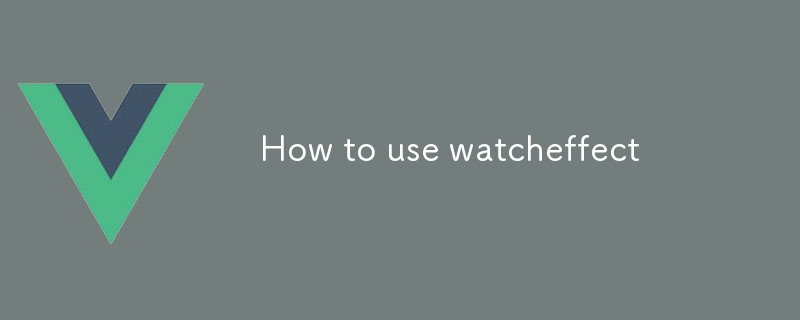Angular의 변화를 감지하는 것은 반응성을 위해 필수적입니다. Angular의 Watch효과 후크를 사용하면 특정 값이나 속성을 모니터링하고 변경 사항에 반응할 수 있습니다. 이 문서에서는 Watch Effect의 구문, 사용법 및 성능에 미치는 영향을 설명합니다. 그것은

Angular의 감시 효과는 특정 값이나 개체 속성의 변경 사항을 모니터링할 수 있는 후크입니다. 기본 구문은 다음과 같습니다.Watcheffect in Angular is a hook that allows you to monitor changes in specific values or object properties. Its basic syntax is as follows:
@Watcheffect(propertyName or parameterName)
effectCallback(changes: ObservableValue<any>) {}To detect changes in a reactive object using Watcheffect, you can use the ngOnChanges lifecycle hook. This hook provides an ngOnChanges property that contains an object with key-value pairs representing the previous and current values of the changed properties. For instance:
@Component(...)
class MyComponent {
@Watcheffect("myProperty")
ngOnChanges(changes: SimpleChanges) {
if (changes["myProperty"]) {
// Do something when the property changes
}
}
}Watcheffect uses zone.js to intercept property accesses and track changes. While it's an effective way to monitor changes, excessive use can lead to performance issues, especially with large objects or frequent property accesses. Consider using @Input and @Output properties or reactivity helpers like BehaviorSubject or ReplaySubject for better performance in most cases.
Watcheffect also allows you to create custom detectors for specific values or expressions. This can be useful when you need more granular control over what triggers a change detection. To create a custom detector, use the @DetectionStrategy property in the @Watcheffect decorator:
@Watcheffect('myExpression', { detectionStrategy: customDetection })
effectCallback(changes: ObservableValue<any>) {}In the example above, customDetectionrrreee
Watch효과를 사용하여 반응형 객체의 변경 사항을 감지하려면 ngOnChanges 수명 주기 후크를 사용할 수 있습니다. 이 후크는 변경된 속성의 이전 값과 현재 값을 나타내는 키-값 쌍이 있는 객체를 포함하는 ngOnChanges 속성을 제공합니다. 예:🎜rrreee🎜Performance Implications🎜🎜Watch Effect는 zone.js를 사용하여 속성 액세스를 가로채고 변경 사항을 추적합니다. 변경 사항을 모니터링하는 효과적인 방법이지만 과도하게 사용하면 특히 대형 개체나 빈번한 속성 액세스의 경우 성능 문제가 발생할 수 있습니다. 대부분의 경우 더 나은 성능을 얻으려면 @Input 및 @Output 속성이나 BehaviorSubject 또는 ReplaySubject와 같은 반응성 도우미를 사용하는 것이 좋습니다. 🎜🎜Watch효과의 사용자 정의 감지기🎜🎜Watch효과를 사용하면 특정 값이나 표현식에 대한 사용자 정의 감지기를 만들 수도 있습니다. 이는 변경 감지를 트리거하는 요소를 보다 세부적으로 제어해야 할 때 유용할 수 있습니다. 맞춤 감지기를 생성하려면 @Watch효과 데코레이터에서 @DetectionStrategy 속성을 사용하세요.🎜rrreee🎜위 예에서 customDetection은 함수입니다. 입력 값을 받아 이전 상태와 현재 상태를 나타내는 값의 튜플을 반환합니다.🎜위 내용은 시계효과를 사용하는 방법의 상세 내용입니다. 자세한 내용은 PHP 중국어 웹사이트의 기타 관련 기사를 참조하세요!